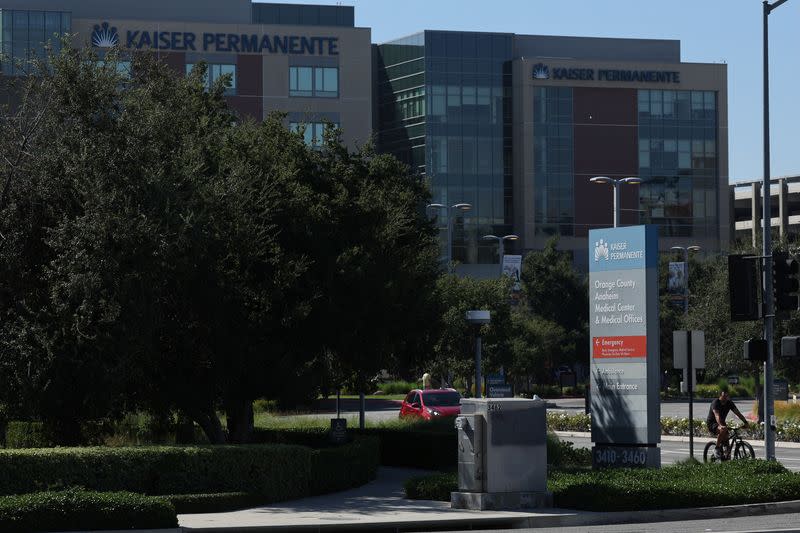Kaiser Permanente and healthcare workers head for labor clash as strike deadline looms
By Ahmed Aboulenein
WASHINGTON (Reuters) - Kaiser Permanente appeared headed for a labor clash with 75,000 of its healthcare workers as union leaders said contract talks had stalled on Tuesday, leaving the two sides hours away from a threatened three-day strike in several states.
The union has set a deadline of 6 a.m. PDT (1300 GMT) Wednesday to reach a tentative deal on a new labor pact covering nurses, medical technicians and support staff in hundreds of hospitals across California, Oregon, Washington state, Colorado, Virginia and Washington, D.C.
Union officials said the planned strike against Kaiser, one of the nation's leading not-for-profit healthcare networks and managed-care organizations, would mark the largest strike ever in the U.S. medical industry.
Kaiser said its hospitals and emergency departments would remain open in the event of a strike, staffed by doctors, managers and other non-union "contingency workers."
As of Tuesday, the Coalition of Kaiser Permanente Unions said the healthcare giant had yet to offer acceptable terms to address severe staffing shortages, or to embrace adequate improvements in pay and benefits sought by the workers.
The previous four-year contract expired on Sept. 30.
Negotiations broke off on Tuesday afternoon, with 17 hours to go before the strike deadline, according to the union coalition, made up of locals representing 85,000 Kaiser employees. More than 75,000 would be idled by a strike.
"Both management and union negotiators are on stand-by waiting for Kaiser executives to resolve their internal debate about whether to do what it takes to reach an agreement," the union coalition's executive director, Caroline Lucas, said in a statement.
A Kaiser spokesperson, Hilary Costa, disputed the union's assertion that negotiators were at a standstill.
Contract talks "are ongoing," she said, adding that Kaiser was "available 24/7 to continue bargaining earnestly with the coalition until we reach a fair and equitable agreement."
"We remain optimistic that there is still an opportunity to reach a deal before any work stoppages begin at 6 a.m. on Wednesday," she said.
Even if there is a walkout, about 60% of Kaiser's workforce would remain on the job, as facilities in Georgia, Hawaii and most of Washington state would not be affected, a company spokesperson said.
In Virginia and Washington, D.C., only optometrists and pharmacists would be on strike, but the impact on patients in California, Colorado, Oregon, and part of southwestern Washington state would be more substantial, she acknowledged.
Staffing levels have been a major sticking point, with the union insisting Kaiser needs to hire 10,000 new healthcare workers to fill current vacancies.
Kaiser employs 68,000 nurses and 213,000 technicians, clerical workers and administrative staff, alongside 24,000 doctors.
Wages are another point of contention. Kaiser said it has offered across-the-board wage increases of 12.5% to 16% over four years, and says the company leads "total compensation in every market where we operate."
Kaiser has reported profits of $3 billion in the first half of 2023 and over $24 billion over the last five years. As a non-profit organization, it pays no income tax on its earnings and very limited property taxes.
A tight U.S. labor market and inflation have led to contentious contract negotiations and strikes over pay and benefits for workers in numerous fields this year, including the automobile and entertainment industries.
Nearly 309,700 workers have been involved in work stoppages through August this year, according to U.S. Bureau of Labor Statistics data, putting 2023 on track to become the busiest year for strikes since 2019.
(Reporting by Ahmed Aboulenein in Washington; Additional reporting by Steve Gorman in Los Angeles; Editing by Bill Berkrot and Gerry Doyle)


